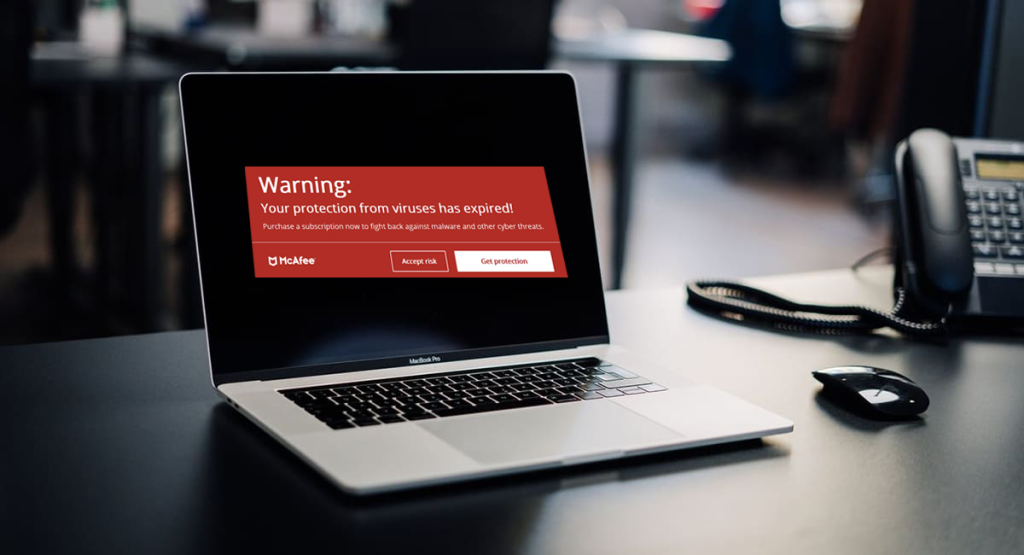You won’t believe what’s been circulating in the digital world lately – rumors of a fake McAfee! With cyber threats on the rise, it’s crucial to ensure the authenticity of your software. But how can you be certain that your McAfee is the real deal? In this discussion, we will explore the validity of these claims and provide you with key insights to help you navigate the realm of online security. Stay tuned to uncover the truth and discover the steps you can take to protect yourself from potential scams.
Identifying Fake McAfee Communications
To identify fake McAfee communications, you can verify the legitimacy of messages by logging on to the official McAfee website and confirming your subscription and renewal status. Genuine McAfee messages will provide accurate information about your subscription, renewal, invoice, or receipt notice. Be cautious of any communication that appears suspicious or contains unusual requests for payment or personal information. Examples of fraudulent McAfee communications may include emails that claim your subscription is expiring and require immediate payment or messages that ask you to provide sensitive information such as credit card details. To ensure the authenticity of the communication, visit McAfee.com and log in to your account to confirm your subscription and renewal status. If you have any doubts or concerns, it is recommended to visit the official McAfee Customer Support site for solutions and assistance. Remember, McAfee will never ask for payment or sensitive information over the phone or through email. Stay vigilant and protect yourself from scams by verifying the legitimacy of McAfee communications.
Protecting Against Web Scams
Protect yourself from web scams by implementing proactive measures to safeguard your personal and financial information. Preventing phishing attacks is crucial. Be cautious of emails or messages that request sensitive information or redirect you to unfamiliar websites. Always verify the legitimacy of shopping websites before making purchases to avoid falling victim to fake shopping websites. Protecting against phone scams involves being skeptical of unsolicited calls asking for personal information or offering too-good-to-be-true deals. To identify email phishing scams, look for signs such as misspellings, generic greetings, and requests for sensitive information. Safeguard against credit card fraud by regularly monitoring your statements, using secure payment methods, and being cautious when entering credit card information online. Remember to keep your operating system, web browsers, and apps updated to protect against malware attacks. By being vigilant and implementing these proactive measures, you can significantly reduce the risk of falling victim to web scams and protect your personal and financial information.
Recognizing and Avoiding Messaging Scams
When it comes to safeguarding yourself against web scams, it is essential to stay vigilant and be knowledgeable about the various types of messaging scams that exist. Common messaging scams include phone scams, chat and text scams, email scams, senior citizen scams, and phishing scams. To spot phone scams, be wary of unsolicited calls asking for personal or financial information. Protect yourself from email scams by avoiding clicking on suspicious links or downloading attachments from unknown senders. Senior citizens should be particularly cautious and educate themselves about the tactics scammers use to exploit their vulnerability. Tips for avoiding phishing scams include being cautious of emails that ask for sensitive information, verifying the legitimacy of the sender, and not clicking on suspicious links. Remember to always trust your instincts and never disclose personal or financial information to unknown or unverified sources. By staying informed and following these precautions, you can protect yourself from falling victim to messaging scams.
Enrolling With Mcafee Identity Protection Services
You can enroll in McAfee Identity Protection Services by visiting protection.mcafee.com and clicking ‘Get Started’. Setting up identity monitoring is an important step to protect your personal information from common types of identity theft. McAfee Identity Protection offers several benefits, such as scanning the dark web for your email address and alerting you if it is found. To activate identity monitoring, simply sign in with your McAfee login credentials and start the setup process. It is crucial to safeguard your personal information in today’s digital age, as identity theft can lead to financial loss and other serious consequences. By enrolling in McAfee Identity Protection Services, you take a proactive step towards protecting yourself from identity theft and its potential ramifications. Remember to follow the steps provided to activate identity monitoring and stay vigilant in safeguarding your personal information.
Additional Customer Service and Email Address Information
For assistance with any concerns or inquiries, McAfee provides free customer service and support. If you come across any suspicious emails claiming to be from McAfee, it is important to be able to identify imposters and know how to report scams. One way to identify a fake email is by checking the sender’s email address. Legitimate McAfee emails will typically come from addresses ending in “@mcafee.com” or “@service.mcafee.com”. Be cautious of emails that come from unfamiliar or suspicious email addresses, as they may be attempting to deceive you. If you receive an email from a fake address, it is crucial to report the scam to McAfee. Reporting scams not only helps protect yourself but also helps prevent others from falling victim to similar fraudulent activities. It is always advisable to trust only legitimate messages from McAfee and to verify the authenticity of any communication before taking any action. Remember, McAfee customer support will never ask for payment or request sensitive information over the phone or through email.
Risks and Consequences of Trusting the Mcafee – Your PC Is Infected With 5 Viruses! Scam
Trusting the Mcafee – Your PC Is Infected With 5 Viruses! scam can have serious consequences for your device’s security and personal information. The risks and consequences of falling for this scam include:
- Financial Losses:
- Victims may pay for fake services, resulting in direct monetary loss.
- Scammers can trick users into purchasing unreliable software or bogus subscriptions.
- Identity Theft:
- Personally identifiable information and financial data can be exposed, leading to potential identity theft.
- Scammers may collect sensitive information during the scam, putting your personal security at risk.
- System Infections:
- In rare cases, the proliferation of malware like ransomware or trojans has been observed.
- Trusting the scam can lead to severe system infections, compromising the integrity of your device.
- Severe Privacy Issues:
- Exposing personal and financial data can result in severe privacy breaches.
- Scammers may gain unauthorized access to your sensitive information, compromising your personal security.
It is crucial to remain cautious and vigilant when encountering such scams to protect yourself from these potential consequences.
Prevention and Protection Against Online Scams in General
To protect yourself against online scams in general, it is important to remain vigilant and take preventive measures. Online scam prevention starts with being able to identify phishing attempts. Be cautious of suspicious emails, messages, or websites that ask for personal information or financial details. Avoid clicking on links or downloading attachments from unknown sources. It is also crucial to regularly update your software, including operating systems, web browsers, and apps. Software updates often include security patches that help protect against vulnerabilities that scammers may exploit. Another important aspect of online scam prevention is recognizing fake shopping sites. Before making a purchase, ensure that the website has secure payment options, a valid SSL certificate, and positive customer reviews. Finally, protecting against credit card fraud involves being cautious when sharing credit card information online. Only provide your credit card details on reputable and secure websites, and regularly monitor your credit card statements for any unauthorized charges. By following these preventive measures, you can significantly reduce the risk of falling victim to online scams and protect your personal and financial information.






